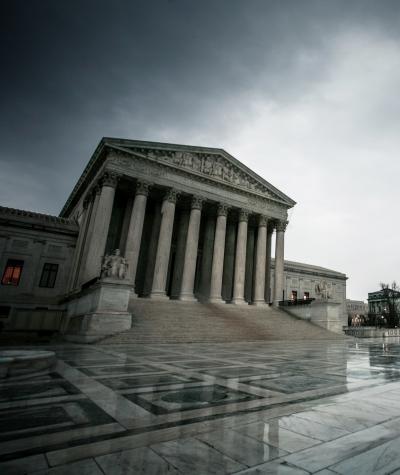The U.S. Supreme Court will hear oral arguments in Moore v. Harper this December, where the court will consider a fringe legal theory that could give state legislatures nearly unchecked power to set the rules for federal elections – with potentially disastrous consequences for election law, the freedom to vote and the health of our democracy.
Moore v. Harper is centered on a gerrymandered congressional map in North Carolina. In 2021, North Carolina legislators crafted a congressional map that gave their own political party an unfair advantage in elections. Partisan legislators used their power to draw voting maps to pick their own voters and manipulate election outcomes, guaranteeing they would control 10 out of 14 congressional seats.
Options for challenging gerrymandered congressional maps are limited because of a Supreme Court decision from 2019, Rucho v. Common Cause. In that case, the Supreme Court ruled that partisan gerrymandering was outside the purview of federal courts, which leaves state courts as one of the last avenues left to fight gerrymandered maps.
North Carolina voters took the map to state court and won. The North Carolina Supreme Court struck down the map for violating the state constitution, finding it “an egregious and intentional partisan gerrymander” designed to give greater voice to voters of one political party more than others.
However, two of the state legislators who crafted the gerrymandered maps were unhappy with the outcome and asked the U.S. Supreme Court to take up the case based on a fringe legal concept known as the “independent state legislature theory.”
The theory is based on an obscure reading of the U.S. Constitution’s Elections Clause and has the potential to fundamentally alter our system of checks and balances on what state legislatures can do when it comes to our elections.
If the Supreme Court adopts the theory, politicians will have a license to pass undemocratic laws that thwart the will of voters by making it harder to vote. It could also open the door to unrestricted partisan gerrymandering, which allows politicians to manipulate election outcomes by choosing their own voters instead of the other way around. State courts would be powerless to stop them.
Since the independent state legislature theory suggests legislators are the only state actors that have the power to draw voting maps, the theory also puts the fate of independent redistricting commissions across the country in jeopardy. These commissions are usually citizen-led to guarantee transparency and impartiality, and are proven to produce fair maps.
Campaign Legal Center filed a friend-of-the court brief in the case, which outlines how dangerous the independent state legislature theory is to our democracy and encourages the Supreme Court to preserve the role state courts and independent redistricting commissions play in facilitating a transparent, inclusive and accountable democracy.
The independent state legislature theory could also throw our elections into chaos by invalidating election rules that voters passed through ballot initiatives and other avenues, such as expanded vote-by-mail or ranked choice voting. States could be forced to create completely different rules for state and federal elections, which would make elections even more confusing for voters.
Checks and balances are a cornerstone of our democracy and help make sure no one person, party or legislative body can abuse their power. The independent state legislature theory removes all checks and balances at the state level and tips the balance of power by eliminating the role state courts, and potentially even independent state redistricting commissions, play in regulating federal elections.
The Supreme Court has a decision to make. It can uphold our system of checks and balances and preserve the right of state courts to reject laws that harm voters, or it can give politicians the unchecked power to write anti-voter laws and manipulate voting maps.


